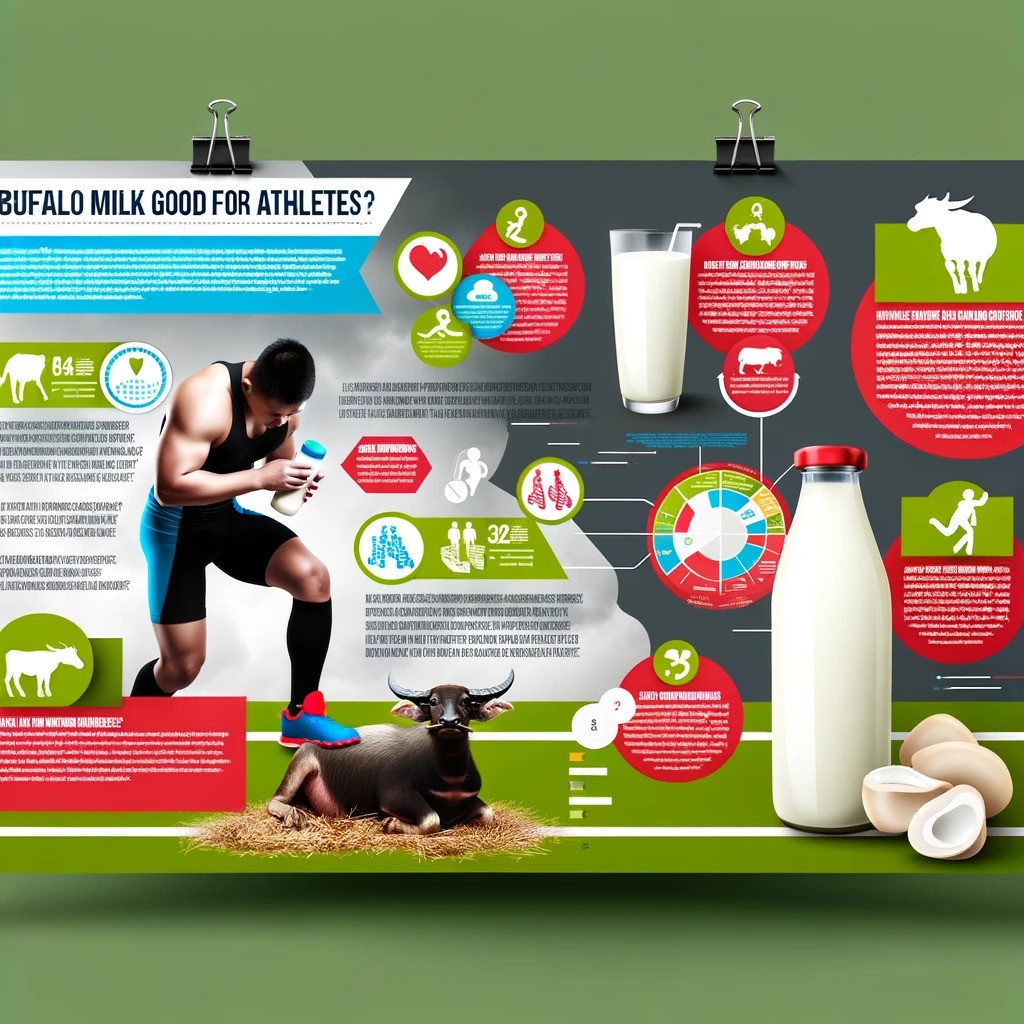As athletes continuously search for foods that fuel their performance and recovery, buffalo milk emerges as a surprising yet promising contender. Unlike the more commonly consumed cow milk, buffalo milk boasts a denser nutritional profile, making it an intriguing option for those dedicated to fitness and health. This article shines a light on buffalo milk, exploring its benefits for athletes, how it measures up against other types of milk, and its potential role in a sports nutrition regimen.
Buffalo milk, while not as ubiquitous as cow’s milk in some regions, has been a dietary staple in others for centuries. Its rich, creamy texture and nutritional superiority lend it a unique position in the dairy hierarchy.
For athletes, the choice of dairy can be crucial, affecting everything from muscle recovery to overall health. Herein, we explore why buffalo milk might just be the superior choice for those leading an active lifestyle.
What is Buffalo Milk?
Buffalo milk comes from water buffaloes, distinct from the cows that produce the majority of the world’s milk supply. Characterized by its high fat and protein content, buffalo milk stands out for its richness and creamy consistency.
Nutritionally, it surpasses cow milk in several areas, including calcium, phosphorus, and vitamin content, making it a powerhouse of essential nutrients. Its unique composition not only makes it a potent source of energy but also a catalyst for muscle recovery and strengthening – attributes that athletes find particularly beneficial.
The presence of higher levels of total solids in buffalo milk also means it is more efficient in cheese production, yielding a richer and creamier product. This aspect, while not directly linked to athletic performance, highlights the versatility and nutritional efficiency of buffalo milk, suggesting its broader benefits in a nutritious diet.
Benefits of Buffalo Milk for Athletes
As a nutritionist and former athlete, I’ve experienced firsthand the unique benefits of integrating buffalo milk into an athlete’s diet. Through my journey, I’ve discovered that this nutrient-rich beverage is more than just a traditional milk alternative; it’s a powerhouse of vitamins, minerals, and antioxidants that can significantly enhance athletic performance and recovery.
Nutritional Powerhouse for Muscle and Bone Strength

One of the standout benefits of buffalo milk for athletes is its impressive protein content, which is crucial for muscle mass development and growth. This high-quality protein, along with B vitamins, supports muscle physique and recovery, making it an excellent choice for those looking to gain weight in muscle and not fat. Additionally, buffalo milk’s rich calcium and phosphorus content is vital for bone health, offering protection against osteoporosis and arthritis, conditions that athletes are often at risk of due to repeated stress on their bones.
Cardiovascular Health and Blood Pressure Management
Athletes require a healthy heart and efficient blood circulation to perform at their peak. Buffalo milk contains potassium and low-density lipoprotein (LDL) reducing components, which help manage blood pressure and reduce the risk of heart disease and stroke. The presence of vitamin B12 and folate in buffalo milk further supports cardiovascular health, ensuring that blood vessels are functioning optimally to deliver oxygen and nutrients to organs and tissues.
Immune System Boost and Chronic Disease Prevention
The immune system benefits greatly from the vitamins A and C found in buffalo milk, acting as antioxidants to cleanse the body of free radicals. This not only boosts the body’s defense against chronic diseases but also supports overall wellness, which is essential for athletes who need to stay healthy and recover quickly from illnesses.
Enhanced Oxygenation and Tissue Health
For athletes, efficient oxygenation of the body is crucial for endurance and performance. The iron in buffalo milk plays a key role in preventing anemia, ensuring that oxygen is efficiently carried to muscles and tissues. This enhances stamina and endurance, allowing athletes to maintain high levels of performance for longer periods.
Skin Health and Recovery
Beyond internal health, buffalo milk also contributes to radiant skin, thanks to its antioxidants and nutrients. Athletes can even use buffalo milk as a homemade face mask to nourish and revitalize their skin, helping them recover from the environmental stresses of outdoor training and competition.
Moderation and Balanced Diet
Despite its numerous benefits, it’s important for athletes to consume buffalo milk in moderation as part of a balanced diet. Integrating healthy foods and maintaining a well-rounded diet ensures that athletes can maximize the benefits of buffalo milk without experiencing any adverse effects associated with overconsumption.
Comparing Buffalo Milk with Other Types of Milk
When evaluating the benefits of buffalo milk for athletes, it’s essential to compare it with other types of milk commonly included in sports nutrition plans. Cow’s milk, goat’s milk, and plant-based alternatives like almond, soy, and oat milk are popular choices, each with its unique nutritional profile. Here, we dive into how buffalo milk stacks up against these alternatives, highlighting its strengths and potential advantages for athletes.
Cow’s Milk vs. Buffalo Milk
Cow’s milk is the most widely consumed milk globally and serves as a reference point for most nutritional comparisons. When juxtaposed with buffalo milk, cow’s milk has a lower fat and protein content, making buffalo milk a denser source of these crucial nutrients.
For athletes seeking to maximize their intake of protein and healthy fats without significantly increasing their volume of consumption, buffalo milk offers a more concentrated source. Additionally, buffalo milk contains higher levels of calcium and phosphorus, essential for bone health and energy metabolism, further supporting its suitability for athletes.
Goat’s Milk vs. Buffalo Milk
Goat’s milk is another alternative, praised for its digestibility and nutritional content. While goat’s milk shares some similarities with buffalo milk, such as a high level of fatty acids and a rich mineral profile, it generally contains less protein and fat than buffalo milk.
For athletes, the higher protein content in buffalo milk means better support for muscle repair and growth, making it a preferable option for those focused on building strength and enhancing performance.
Plant-Based Milks vs. Buffalo Milk
Plant-based milks have gained popularity among athletes, especially those following vegetarian or vegan diets. However, while options like almond, soy, and oat milk offer benefits such as lower calories and no cholesterol, they often fall short in protein and mineral content compared to buffalo milk.
Soy milk comes closest in terms of protein but lacks the comprehensive array of minerals found in buffalo milk. For athletes not restricted by dietary choices, buffalo milk provides a more complete nutritional profile, essential for peak performance and recovery.
Buffalo Milk and Lactose Intolerance
Lactose intolerance is a common concern that affects how individuals choose their milk. Buffalo milk contains lactose levels similar to cow milk, which might not make it suitable for those with lactose intolerance. However, for athletes who can tolerate lactose, the nutritional benefits of buffalo milk make it a superior choice.
For those who cannot, exploring lactose-free buffalo milk options or using lactase enzyme supplements could be beneficial. It’s also important to note that fermentation processes, such as those used in making yogurt or kefir, can reduce lactose content, making these products more digestible for lactose-intolerant individuals.
Cow’s Milk or Buffalo Milk – Which is Better for Bodybuilding?
When it comes to bodybuilding, the choice between cow’s milk and buffalo milk can significantly impact your nutritional intake and muscle-building efforts. Buffalo milk, with its higher protein content, more abundant minerals like calcium and phosphorus, and richer fat profile, offers a more concentrated source of nutrients essential for muscle growth and recovery.
The elevated protein levels support the repair and growth of muscle tissue, crucial after intensive workouts. Additionally, the higher fat content, though might be considered a concern for some, consists largely of healthier fats, which can provide sustained energy required for rigorous training sessions.
On the other hand, cow’s milk is more widely available and may be preferable for those looking for a lighter option with less fat. However, for bodybuilders aiming to maximize their dietary intake for muscle gain and recovery, buffalo milk stands out as the superior option, providing a denser nutritional package per serving. Incorporating buffalo milk into the diet could, therefore, be a strategic move for bodybuilders seeking to enhance their nutritional intake and support their bodybuilding goals.
How Athletes Can Incorporate Buffalo Milk into Their Diet

Incorporating buffalo milk into an athlete’s diet can be both innovative and beneficial, given its dense nutritional profile and health benefits. Here are several practical ways athletes can include buffalo milk in their daily regimen:
- Post-Workout Recovery Shake: Blend buffalo milk with your choice of protein powder, fruits, and a handful of nuts or seeds for a recovery shake. This combination provides proteins for muscle repair, carbohydrates for replenishing energy stores, and fats for sustained energy release.
- Meal Replacements or Supplements: For athletes with high energy needs, buffalo milk can serve as a base for homemade meal replacement shakes. Add oats, banana, peanut butter, and a scoop of protein powder to buffalo milk for a nutritious and filling meal on-the-go.
- Dairy Base for Cereals and Smoothies: Use buffalo milk instead of cow’s milk or water in your cereals and smoothies. Its rich texture and nutritional profile can enhance the taste and health benefits of your breakfast or snack.
- Protein-rich Snacks: Make homemade paneer (cottage cheese) or yogurt with buffalo milk. These are excellent sources of protein and can be included in meals or taken as snacks throughout the day.
- Hydration and Nutritional Boost: Simply drinking a glass of buffalo milk can hydrate and provide a quick nutritional boost, especially useful on rest days or as a night-time beverage to support muscle repair during sleep.
By integrating buffalo milk into their diets through these methods, athletes can leverage its nutritional benefits to support their training, recovery, and overall health.
Conclusion
Buffalo milk emerges as a superior nutritional ally for athletes, offering a rich array of benefits that can significantly enhance athletic performance, recovery, and overall well-being. Its high protein content, rich mineral profile, quality fats, and bioactive components make it an exceptional choice for those seeking to optimize their nutrition in support of their athletic goals.
Adopting buffalo milk into an athlete’s diet is not just about adding another source of dairy; it’s about embracing a nutrient-dense food that can contribute to stronger muscles, healthier bones, and improved recovery times.
Frequently Asked Questions
Which type of milk is best for athletes?
For athletes, buffalo milk is often considered superior due to its high protein content, rich mineral profile, and beneficial fats. These qualities make it excellent for muscle repair, recovery, and overall athletic performance.
Is buffalo milk good for building muscle?
Yes, buffalo milk is highly beneficial for building muscle. Its high protein content, along with essential amino acids, supports muscle repair and growth, making it an ideal choice for those looking to increase muscle mass.
What is the disadvantage of buffalo milk?
The main disadvantage of buffalo milk could be its high fat content, which might not align with the dietary preferences or requirements of all individuals. Additionally, it might be less available in certain regions compared to cow’s milk.
What are the benefits of drinking buffalo milk?
Drinking buffalo milk offers numerous benefits, including enhanced muscle repair and growth, improved bone health due to its high calcium content, and better recovery post-exercise because of its rich nutritional profile.
Which milk has the highest protein?
Buffalo milk has the highest protein content among common types of milk, making it exceptionally beneficial for athletes and individuals engaged in regular physical activity.
What type of milk is best for muscle?
For muscle repair and growth, buffalo milk is considered the best due to its high protein content and presence of all essential amino acids required for muscle recovery and development.

